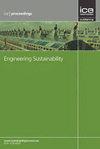Pandemic response in the energy sector and implications for critical infrastructure resilience management
IF 1.5
4区 工程技术
Q3 ENGINEERING, CIVIL
Proceedings of the Institution of Civil Engineers-Engineering Sustainability
Pub Date : 2022-05-16
DOI:10.1680/jensu.21.00094
引用次数: 0
Abstract
Covid-19 highlighted shortcomings in the ability of critical infrastructure organisations to manage and operate their systems and assets. While the possibility of a pandemic was not unknown, management protocols fell short of preparing for this ‘tail-risk’ scenario. This paper assesses organisational response to the global pandemic and what this reveals in terms of: (a) attitudes towards risks that do not typically manifest as operational priorities to address and (b) the implications for organisational resilience. Covid-19 impact management strategies developed by critical infrastructure organisations and their potential implications on wider risks and management capabilities are reviewed. The complex and evolving nature of critical infrastructure system management is demonstrated through examples of risk interconnectivity and resource scarcity. For example, the pandemic did not directly impact physical infrastructure, yet cascading issues are revealed that relate to the forced delay of planned asset maintenance and the impacts of supply chain disruptions. This paper demonstrates the need for holistic, multi-hazard management approaches in critical infrastructure organisations to ensure a level of operational resilience that is required for the 21st Century. This paper also views critical infrastructure organisations as sociotechnical entities and highlights how building a resilience-oriented working culture can support effective risk planning and investment decisions.能源部门的大流行应对及其对关键基础设施复原力管理的影响
2019冠状病毒病凸显了关键基础设施组织管理和运营其系统和资产的能力不足。虽然大流行的可能性并非未知,但管理方案未能为这种“尾部风险”情景做好准备。本文评估了组织对全球流行病的反应,以及这在以下方面揭示了什么:(a)对通常不表现为需要解决的业务优先事项的风险的态度,以及(b)对组织复原力的影响。审查了关键基础设施组织制定的Covid-19影响管理战略及其对更广泛风险和管理能力的潜在影响。通过风险互联性和资源稀缺性的例子,展示了关键基础设施系统管理的复杂性和不断发展的本质。例如,大流行并未直接影响实体基础设施,但揭示了与计划资产维护的强制延迟和供应链中断的影响有关的级联问题。本文展示了在关键基础设施组织中需要采用全面的、多灾害管理方法,以确保21世纪所需的运营弹性水平。本文还将关键基础设施组织视为社会技术实体,并强调了如何建立以弹性为导向的工作文化来支持有效的风险规划和投资决策。
本文章由计算机程序翻译,如有差异,请以英文原文为准。
求助全文
约1分钟内获得全文
求助全文
来源期刊

Proceedings of the Institution of Civil Engineers-Engineering Sustainability
ENGINEERING, CIVIL-ENGINEERING, CIVIL
CiteScore
3.70
自引率
16.70%
发文量
44
审稿时长
>12 weeks
期刊介绍:
Engineering Sustainability provides a forum for sharing the latest thinking from research and practice, and increasingly is presenting the ''how to'' of engineering a resilient future. The journal features refereed papers and shorter articles relating to the pursuit and implementation of sustainability principles through engineering planning, design and application. The tensions between and integration of social, economic and environmental considerations within such schemes are of particular relevance. Methodologies for assessing sustainability, policy issues, education and corporate responsibility will also be included. The aims will be met primarily by providing papers and briefing notes (including case histories and best practice guidance) of use to decision-makers, practitioners, researchers and students.
 求助内容:
求助内容: 应助结果提醒方式:
应助结果提醒方式:


